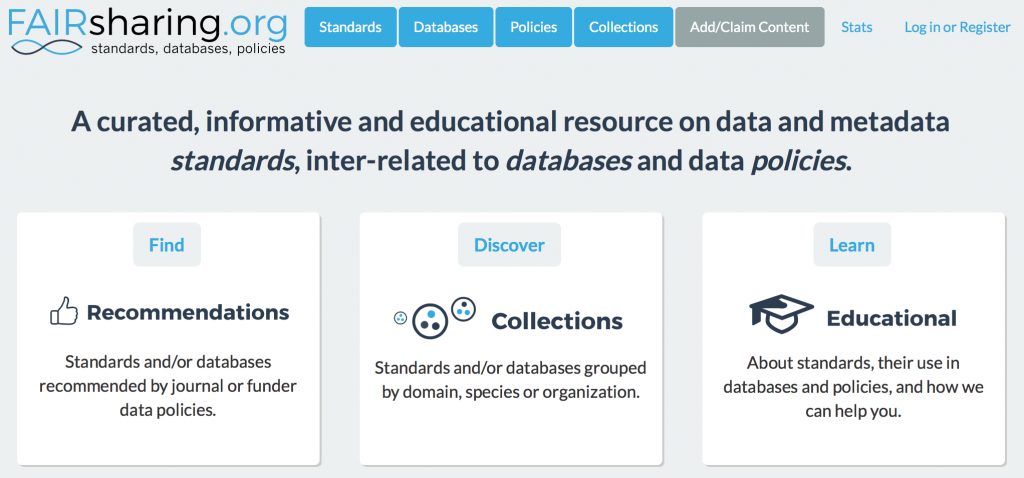Posts Tagged ‘Knowledge representation’
Thursday, April 18th, 2019
In a previous post, I looked at the Findability of FAIR data in common chemistry journals. Here I move on to the next letter, the A = Accessible.
(more…)
Tags:Academic publishing, automatic processing, Data management, Digital Object Identifier, EIDR, FAIR data, Findability, Identifiers, Information, Information architecture, Information science, Knowledge, Knowledge representation, metadata, mining, Open Archives Initiative, RDF, Records management, representative, standardized communication protocol, Technical communication, Technology/Internet, Web design, Written communication, XML
Posted in Chemical IT | No Comments »
Friday, April 12th, 2019
In recent years, findable data has become ever more important (the F in FAIR). Here I test that F using the DataCite search service.
(more…)
Tags:Academic publishing, DataCite, Digital Object Identifier, Digital technology, Elsevier, Findability, Identifiers, Information, Information architecture, Information science, Knowledge, Knowledge representation, search service, Web design
Posted in Chemical IT | 1 Comment »
Monday, April 8th, 2019
The conventional procedures for reporting analysis or new results in science is to compose an “article”, augment that perhaps with “supporting information” or “SI”, submit to a journal which undertakes peer review, with revision as necessary for acceptance and finally publication. If errors in the original are later identified, a separate corrigendum can be submitted to the same journal, although this is relatively rare. Any new information which appears post-publication is then considered for a new article, and the cycle continues. Here I consider the possibilities for variations in this sequence of events.
(more…)
Tags:Academic publishing, American Chemical Society, author, Business intelligence, Company: DataCite, CrossRef, data, Data management, DataCite, editor, EIDR, Information, Information science, JSON, Knowledge representation, Metadata repository, Records management, Technology/Internet, The Metadata Company
Posted in Chemical IT | No Comments »
Saturday, February 16th, 2019
The title of this post comes from the site www.crossref.org/members/prep/ Here you can explore how your favourite publisher of scientific articles exposes metadata for their journal.
(more…)
Tags:Aaron Swartz, Academic publishing, API, Business intelligence, CrossRef, data, Data management, Elsevier, favourite publisher, Identifiers, Information, Information science, Knowledge, Knowledge representation, metadata, mining, ORCiD, PDF, Pre-exposure prophylaxis, Publishing, Publishing Requirements for Industry Standard Metadata, Records management, Research Object, Scholarly communication, Scientific literature, search engine, social media, Technical communication, Technology/Internet, text mining, Written communication, XML
Posted in Interesting chemistry | 1 Comment »
Sunday, May 6th, 2018
The site fairsharing.org is a repository of information about FAIR (Findable, Accessible, Interoperable and Reusable) objects such as research data.

(more…)
Tags:above site, chemical components, Findability, Human behavior, Information, Information architecture, Information science, Institutional repository, journal data editor, Knowledge, Knowledge representation, Open access, Open access in Australia, Oscar, PDF, recognition software, Technology/Internet, Web design
Posted in Interesting chemistry | 2 Comments »
Tuesday, November 14th, 2017
PIDapalooza is a new forum concerned with discussing all things persistent, hence PID. You might wonder what possible interest a chemist might have in such an apparently arcane subject, but think of it in terms of how to find the proverbial needle in a haystack in a time when needles might look all very similar. Even needles need descriptions, they are not all alike and PIDs are a way of providing high quality information (metadata) about a digital object.
(more…)
Tags:chemist, computing, Information, Information science, Knowledge representation, librarian, Needle, PID
Posted in Chemical IT | No Comments »
Saturday, April 16th, 2016
Scientists are familiar with the term data, at least in a scientific or chemical context, but appreciating metadata (meaning "after", or "beyond") is slightly more subtle, in the sense of using it to mean data about data. The challenge lies in clarifying where the boundary between data and its metadata lies and in specifying and controlling the vocabulary used for these metadata descriptions. Items in a chemical metadata dictionary might include e.g. subject classifications such as Organic Molecular Chemistry or identifiers such as InChIkey. But what could metametadata be? Here I briefly show some examples by way of illustration.
(more…)
Tags:Academic publishing, automated software analysis, BASE, chemical context, Chemical Database Service, chemical metadata, chemical metadata dictionary, chemical space, City: Cambridge, Data dictionary, Data management, Identifiers, Knowledge representation, programmer, Registry of Research Data Repositories, search.datacite.org/api, SPECTRa, Technology/Internet
Posted in Chemical IT | No Comments »
Saturday, June 20th, 2015
The university sector in the UK has quality inspections of its research outputs conducted every seven years, going by the name of REF or Research Excellence Framework. The next one is due around 2020, and already preparations are under way! Here I describe how I have interpreted one of its strictures; that all UK funded research outputs (i.e. research publications in international journals) must be made available in open unrestricted form within three months of the article being accepted for publication, or they will not be eligible for consideration in 2020.
(more…)
Tags:Academia, Academic publishing, Archival science, author, Data management, Digital library, EPrints, Institutional repository, Knowledge, Knowledge representation, Library science, metadata, Open access, PDF, personal web page, Preprint, Publishing, Repository, researcher, ROMEO GREEN, Science, Technology/Internet, United Kingdom, web server
Posted in Chemical IT | No Comments »
